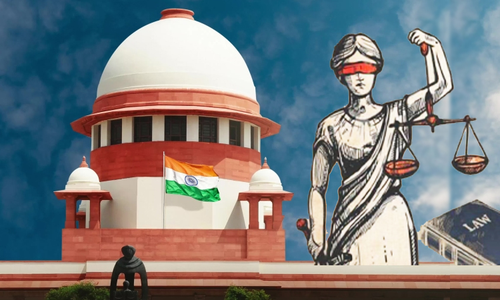
New Delhi, Dec 5 : The Supreme Court on Tuesday issued notice to the Union government on a plea filed against restrictions imposed on single unmarried women from availing surrogacy.
A bench of Justices B.V. Nagarathna and Ujjal Bhuyan agreed to examine the petition filed by a practicing lawyer seeking to “realise the right of reproduction and motherhood”.
Senior advocate Saurabh Kirpal pleaded that the petitioner, having a diabetic condition and 40 years of age, has a right to reproduction and motherhood even without entering a marriage as she intends to “secure her right of availing surrogacy and experience motherhood on her terms without state’s interference in her private life”.
The petition, filed through advocate Malak Manish Bhatt, said that the petitioner is excluded from availing the benefits of scientific and medical advancement by way of various provisions of the Surrogacy (Regulation) Act, 2021 and the Surrogacy (Regulation) Rules, 2022.
It said that barring single unmarried women from availing surrogacy while allowing the same for divorced or widowed women is “manifestly arbitrary and irrational” as there is no restriction on a single unmarried woman adopting a child or having a child out of wedlock.
“The right to a meaningful family life, which allows a person to live a fulfilling life and helps in retaining her physical, psychological and emotional integrity falls within the ambit of Article 21 of the Constitution,” said the plea, adding that the restriction of surrogacy to only divorced and widowed women is in violation of fundamental rights under the Constitution.
Further, the plea challenges the prohibition on any monetary compensation to the surrogate mother saying that “it would shake the conscience of the petitioner to ask of another woman to undertake gestational surrogacy for 9 months and the rigors of pregnancy with all its attendant risks, impact on quality of life, impact on the body, impact on mind (post-partum depression) and loss of income, without any monetary consideration”.
The petition said: “The (Surrogacy) Act violates the test of proportionality since instead of regulating commercial surrogacy to address any potential concerns of exploitation of surrogate mother, it chooses to completely prohibit any monetary consideration/ compensation to a surrogate mother.”
It also challenged the condition “which prohibits use of donor eggs and requires single woman to only use self-eggs”.
Earlier, pleas were filed in the top court against a notification issued by the Health and Family Welfare Ministry prohibiting donor gametes to couples wanting children through surrogacy. The Supreme Court had also issued notice on a PIL challenging the vires of Surrogacy Act, 2021 and the Assisted Reproductive Technology Act, 2021, for direct infringement on reproductive rights of women.






